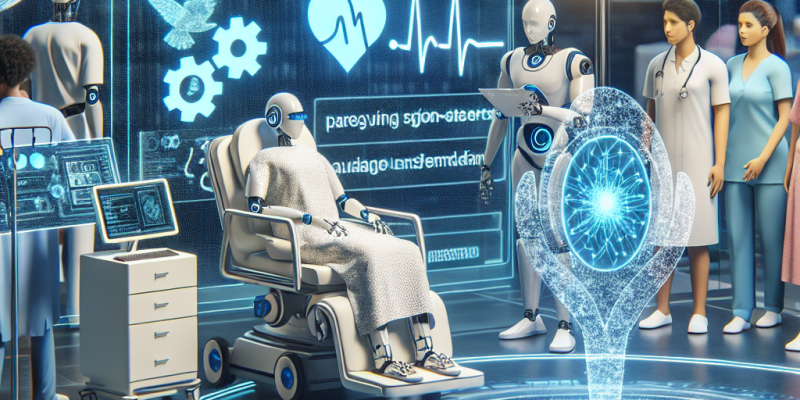NLP in Healthcare: Revolutionizing Patient Care Through Language Understanding

Natural Language Processing (NLP), a subset of artificial intelligence (AI), has gained significant traction in various sectors over the past few years, and one area where it is making a profound impact is healthcare. With the increasing volume of unstructured data generated in the form of clinical notes, patient interactions, and clinical research documents, NLP offers transformative solutions that enhance patient care, streamline processes, and improve healthcare outcomes.
Understanding NLP: The Basics
NLP enables computers to understand, interpret, and respond to human language in a meaningful way. This involves analyzing text and speech to extract information, summarize content, and even predict patient outcomes. By bridging the gap between human language and machine comprehension, NLP tools can automate several tasks that traditionally consumed substantial time and resources.
The Role of NLP in Healthcare
1. Enhancing Patient Care
One of the most significant applications of NLP in healthcare is improving the quality and timeliness of patient care. Tools powered by NLP can analyze clinical notes and electronic health records (EHRs), allowing healthcare providers to extract critical information about a patient’s medical history, allergies, and treatment plans quickly.
For instance, NLP can identify keywords and phrases related to a patient’s condition, providing physicians with comprehensive insights at the point of care. This capability minimizes errors, enhances diagnosis accuracy, and ensures that patients receive personalized care tailored to their needs.
2. Streamlining Documentation
Healthcare professionals spend a considerable amount of time on documentation, often leading to burnout and reduced patient interaction. NLP can automate the transcription and documentation process, allowing providers to focus more on patient care rather than administrative tasks.
Speech recognition technologies, powered by NLP, enable providers to dictate notes and have them automatically transcribed into structured formats. This not only saves time but also ensures that important patient information is accurately captured and readily accessible for future consultations.
3. Improving Clinical Research
NLP has substantial potential in clinical research by analyzing vast datasets from published studies, clinical trial reports, and patient records. Researchers can leverage NLP algorithms to identify trends, extract relevant information, and even predict outcomes based on historical data.
Moreover, NLP can assist in generating insights from patient-reported outcomes and reviews, ensuring that researchers are attuned to real-world experiences and preferences. This leads to better-designed studies and improvements in clinical guidelines, ultimately enhancing treatment protocols.
4. Enhancing Patient Engagement
The doctor-patient relationship has evolved with technology, and NLP plays a crucial role in facilitating this change. Chatbots and virtual assistants powered by NLP can provide patients with instant responses to their queries, appointment scheduling services, and medication reminders.
These tools can engage patients in their care journey, offering information about their conditions and treatment options. By empowering patients with knowledge, NLP fosters proactive involvement in healthcare, which is essential for successful outcomes.
5. Predictive Analytics and Risk Stratification
NLP can contribute to predictive analytics by scanning vast amounts of data for patterns that precede health-related events. By analyzing unstructured data from EHRs, medical literature, and even social media, NLP can identify high-risk patients who may require more intensive care or early intervention.
For instance, NLP algorithms can flag patients who may be at risk for readmission and prompt healthcare providers to take preventative actions. This not only improves patient safety but also helps reduce healthcare costs associated with unnecessary hospitalizations.
Challenges and Considerations
Despite its promise, the integration of NLP in healthcare is not without challenges. Data privacy and security remain paramount concerns, as healthcare providers must protect sensitive patient information while leveraging NLP solutions. Additionally, the variability of medical terminology and language makes it essential that NLP systems are trained specifically for the healthcare domain to ensure accuracy.
Furthermore, algorithms must be continuously refined to minimize bias and improve their effectiveness across diverse patient populations. Continuous collaboration between technologists, clinicians, and regulators is vital to address these challenges and facilitate the responsible integration of NLP into clinical practice.
Conclusion
NLP is poised to revolutionize healthcare by enhancing patient care, streamlining documentation, facilitating clinical research, and promoting patient engagement. As technology evolves, the integration of NLP tools will likely become standard practice, leading to improved health outcomes and more efficient healthcare systems.
In an era where data is king and effective communication is critical, harnessing the power of NLP could be the key to unlocking a new frontier in patient care, making healthcare more accessible, personalized, and efficient for all.














